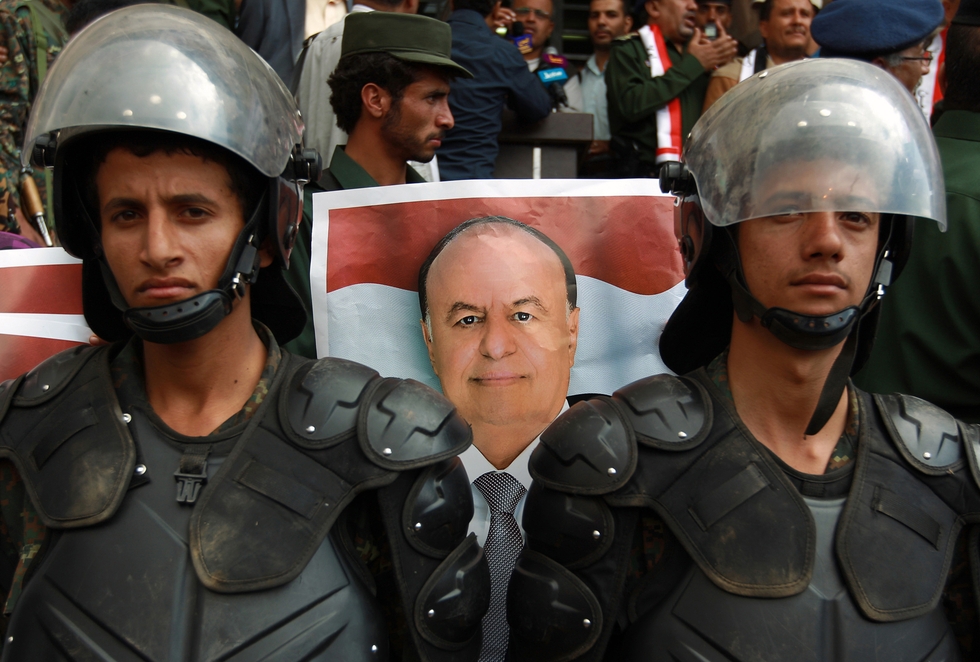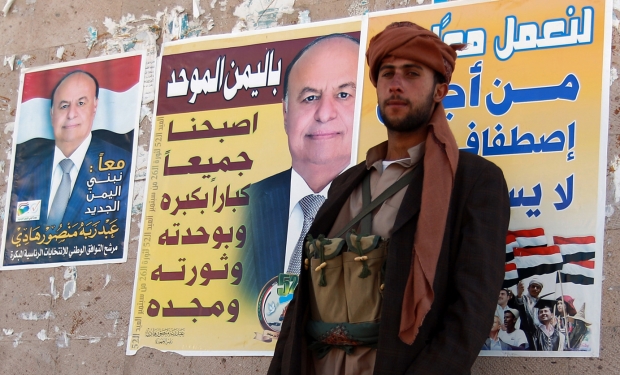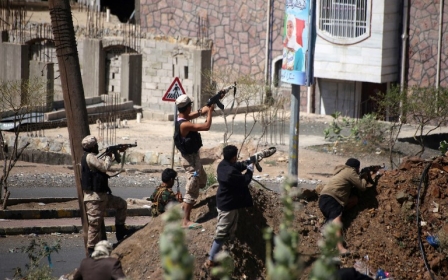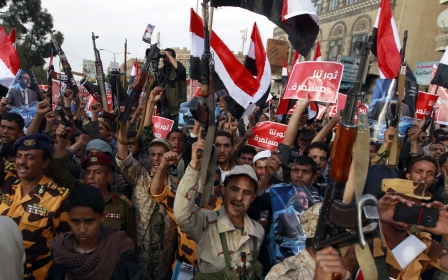Hadi faces growing opposition as Yemen peace talks loom

TAIZ, Yemen - The Saudi-backed president of Yemen is facing a growing battle for survival, as his administration fractures, former supporters call for his removal and enemies declare they will never accept him in a post-war government.
Houthi rebels say they will never accept Abd Rabbuh Mansour Hadi as Yemen's leader, saying the "traitor" would not be welcome in the capital Sanaa even if peace talks scheduled later this month are successful.
The comments to Middle East Eye come before a 10 April ceasefire between Hadi's forces and those of the Houthi movement, which will be followed a week later by talks in Kuwait to end Yemen's year-long conflict.
A source in the Houthi political office, speaking on condition of anonymity, said the Houthis welcomed the peace talks but would never allow Hadi and his backers to rule them.
"If Saudi Arabia needs to end the war in Yemen, the traitor Hadi should not be part of the solution," the source said.
New MEE newsletter: Jerusalem Dispatch
Sign up to get the latest insights and analysis on Israel-Palestine, alongside Turkey Unpacked and other MEE newsletters
"Yemenis will not accept him again after he brought the invasion to destroy our country."
He stated Yemen was sick of war and was in dire need of peace talks, but Houthis were steadfast that a political solution should not involve Hadi.
"The Houthis forgave Ali Saleh who fought them in Saada for six years," he said in reference to the former president who is now aligned with the Houthis.
"They can forgive anyone who did not participate in the invasion against Yemenis - but they cannot forgive traitors."
The source's comments, which repeatedly included the words "traitor" and "invasion", are a shot across the bows of Saudi and Gulf efforts to end the fighting in Yemen, and follow Hadi's apparent attempt to purge his own administration of enemies.
On Saturday he sacked his prime minister and vice-president, Khalid Bahah, stating that his dismissal was due to "failures that have accompanied the performance of the government".
Bahah hit back on Tuesday, saying his dismissal went against UN resolution 2216, which he said stated that the prime minister was chosen by ministers, rather than the president.
He added that his sacking also contravened agreements made in the National Dialogue conference of 2014, and the Gulf Cooperation Council-brokered agreement that set up the Hadi administration.
Bahah's sacking has made public the split between Hadi and Bahah supporters, according to political analyst and former managing editor of al-Tagheer news website, Mohammed al-Hassani.
"The dispute means that Hadi has to leave the leadership as Bahah has more acceptance by the different sides in Yemen, and the Houthis can accept him, but they will not accept Hadi."
He said the dispute ultimately splintered the Saudi-backed administration - much in the interests of the Houthis.
"It seems that Hadi is not willing to leave the leadership and this is the main reason that made him demote Bahah, and this is not in the interest of the peace talks."
Hassani said peace talks in Kuwait had to appoint a new leader to Yemen who is neutral, and not one of the old leaders such as Hadi or Ali Mohsen al-Ahmer, Saleh's former right-hand man and Bahah's replacement, but someone who appealed to all sides.
He suggested Sanaa's mayor, Abdulqader Hilal, as a possibility.
In his most recent visit to Yemen's capital, UN special envoy Ismail Ould al-Sheikh met Hilal - a man seen by many as among the most neutral leaders in the conflict.
On Thursday, US Secretary of State John Kerry joined in criticism of Hadi, suggesting at a news conference in Bahrain that he had complicated efforts to secure a ceasefire "quite significantly".
"We still believe that negotiations ought to take place. We still believe the ceasefire ought to take place. But we’ve got to work on the politics of it," Kerry said.
On Tuesday, the spokesman of the Houthis, Mohammed Abdulsallam, said on Facebook that the Houthis would halt the fighting in some provinces to facilitate the peace talks.
He stated that there has been agreement on a number of issues to restore calm to the border areas between Saudi Arabia and Yemen.
Already, Saudi coalition troops have stopped fighting and have restricted themselves to training local fighters. Houthis have already sent delegations to Saudi Arabia.
But Hadi appears to be the sticking point among both Houthi supporters, civilians and even those fighting in the anti-Houthi "popular resistance" forces.
Huge protests were held in Sanaa last month on the anniversary of the Saudi campaign in Yemen. The crowds included not only Houthi supporters and those backing Ali Saleh.
Hamdi Abubaker, 28, protested because he lost his job in tourism soon after the war began.
"The Houthis took over Sanaa on 21 September 2014, and we continued to work until March 2015, and when the Saudi-led coalition started their campaign against Yemen we lost our jobs," he said. "Saudi Arabia is our enemy and not the Houthis."
He stated that he was not a Houthi supporter but was against Hadi and his government, which "destroyed the country".
Some popular resistance fighters in Taiz province, who have battled the Houthis and their siege of its provincial capital, also expressed their opposition to Hadi.
Adnan al-Yusofi, 35, said: "Hadi did not help us in Taiz province and he did not support us with enough military reinforcements, so we do not want this man to return again."
He said many in Taiz died in the name of liberation, but liberation meant getting rid of the last regime, which includes Hadi.
Yusofi, another resistance fighter, said he opposed both the Houthis and the Hadi administration.
"I am an educated man, and I need an educated man to be president of my country," he said.
He said he would fight Hadi as fiercely as the Houthis if he remained president.
Fadhl al-Rabei, a political analyst and the head of Madar Strategic Studies Centre, said the comments were typical of many fighters.
"Most are fighting because of their country or because they hate the thought of the Houthis, so we cannot say that they are pro-Hadi fighters, but they are anti-Houthi fighters."
He said Salafi groups, who had fought against the Houthis, were also anti-Hadi and would not accept him as a president.
"The Salafis fought with the resistance in Aden, but when Hadi returned they became anti-Hadi fighters," he said.
"They do not want him to be a president, and they accuse Hadi of bringing the Houthis to Aden, and the same thing will happen in Taiz."
He stated that if Hadi was a wise man, he would leave the presidency and give it to someone else who is accepted by all sides in Yemen.
Leaders of the popular resistance in Taiz declined to comment on their official position on Hadi, stating they could only do so after the defeat of the Houthis.
The Hadi presidency does not have an office in Yemen to contact for comment.
Middle East Eye delivers independent and unrivalled coverage and analysis of the Middle East, North Africa and beyond. To learn more about republishing this content and the associated fees, please fill out this form. More about MEE can be found here.





